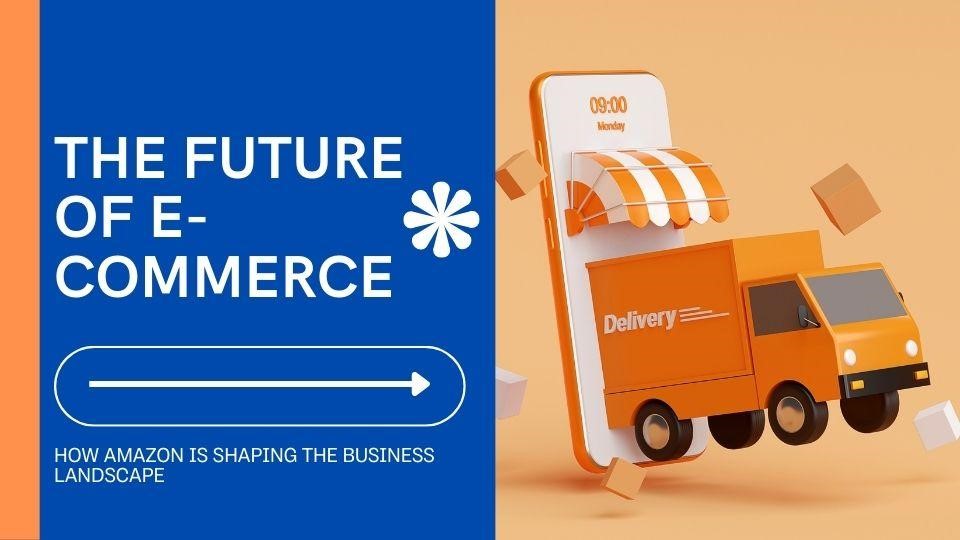E-commerce has revolutionized how we shop and conduct business, with Amazon at the forefront of this digital transformation. Amazon’s unprecedented growth and dominance have not only dislocated traditional retail but also set the course for future e-commerce developments. From humble beginnings as an online bookstore to becoming a global powerhouse offering an abundance of products redefining the shopping experience – in this blog post we will look at how Amazon is changing the business landscape and explore what impact their strategies could have on future e-commerce developments.
The Rise of Amazon in E-Commerce
Amazon first emerged as an online bookstore in the late 90s, yet no one could anticipate its seismic effect on business. Jeff Bezos’ visionary founder had grand ambitions of creating “Earth’s Biggest Bookstore,” but soon enough it was apparent that this ambitious goal had far broader ambitions.
From its inception, Amazon stood out from competitors by prioritizing customer satisfaction. Their mission wasn’t simply about selling books; rather it was creating an experience that resonated with readers tired of browsing physical bookstores. Their customer-first philosophy has helped Amazon grow into one of the premier ecommerce providers today.
As Amazon expanded beyond books, they quickly met consumers’ desires and needs across numerous categories. Their commitment to selection and competitive pricing drew customers who sought convenience, value, and finding virtually everything they desired on Amazon’s virtual shelves; captivating both imaginations and wallets of millions in doing so.
Amazon’s third-party seller ecosystem also played an integral part in its rise. By opening up their marketplace to independent sellers, Amazon created a win-win scenario: small businesses had access to a vast customer base while Amazon expanded their product selection without taking on inventory ownership risks.
Amazon wasn’t simply successful through their business model alone. Behind-the-scenes, they leveraged cutting-edge technologies and data analytics to streamline operations and enhance customer experiences – from personalized product recommendations to innovative fulfillment and logistics systems, they revolutionized how e-commerce operated.
Amazon’s Disruptive Influence on Traditional Retail
Imagine a bustling shopping mall on a sunny weekend: once full of shoppers eager to peruse racks of clothing or the latest gadgets. In recent years, however, foot traffic has declined precipitously and store closures have become commonplace due to Amazon’s convenient product offerings that have transformed consumer behavior, leaving traditional retailers scrambling for ways to adapt.
Traditional retailers for decades relied on physical storefronts as the main interface with customers, but Amazon changed this model by popularizing online shopping at scale. Customers quickly discovered its convenience, shrugging off long lines and parking lot congestion to shop from home in peace. Soon thereafter, more consumers than ever began switching over to Amazon as consumers discovered its vast digital marketplace instead of local shops.
Amazon has not only become popular due to convenience. Their competitive prices, often lower than in traditional brick and mortar establishments, and Offers provided by them has further solidified their disruptive influence. Consumers appreciate the cost savings and value offered by Amazon. In order to retain customers, Amazon has its Quiz answer game where a user can get a chance to win Physical products.
Yet, amid this turmoil, traditional retailers saw some hope emerge in spite of Amazon’s disruption. Some recognized the need to adapt and evolve in response to Amazon’s dominance; those that embraced digital transformation, merging online and offline experiences into one seamless customer journey, found new ways of engaging customers; click-and-collect services became popular as an intermediary between physical stores and virtual ones.
Traditional retailers also realized the value of providing customers with distinctive in-store experiences that couldn’t easily be duplicated online. By providing personalized service and using their expertise and local knowledge to foster community, traditional retailers were able to differentiate themselves not just on price or convenience alone but by creating lasting connections that couldn’t easily be duplicated on Amazon.
Amazon’s Ecosystem and Business Strategies
At the core of Amazon’s remarkable success lies its unparalleled ability to build an expansive ecosystem that extends far beyond being simply an online marketplace. Amazon has established an empire comprising various product lines and services designed to bring unparalleled convenience and customer satisfaction.
Enter Amazon Prime: an immersive experience embraced by millions. As an Amazon Prime member, you have access to multiple benefits – not only can packages arrive quickly and on schedule but you also gain access to movies, Anime TV shows, music albums, books and much more – extending value beyond shipping services alone. Amazon Prime membership promises both entertainment and convenience all in one package!
Amazon Web Services (AWS), however, expanded their ecosystem even further. AWS made them a force in cloud computing with its robust infrastructure powering numerous websites, apps, and businesses – not only diversifying revenue streams but also solidifying Amazon as a technology leader.
One of the hallmarks of Amazon’s ecosystem is its marketplace model. By welcoming third-party sellers onto its platform, Amazon has successfully created a win-win situation for all parties involved: independent sellers gain access to Amazon’s expansive customer base and logistics infrastructure while Amazon expands product selection without owning inventory ensuring customers always have plenty of options available to them. The marketplace model serves as an enduring testament of their dedication to customer centricity as well as their understanding of collaboration’s power.
The Power of Data and Artificial Intelligence
Amazon knows data to be king in today’s digital era and wields it effectively. Their ability to gather, analyze, and leverage vast amounts of data has been central to their success; from understanding customer preferences to streamlining operations – Amazon uses their data-driven approach in all facets of its business.
Take, for instance, Amazon’s personalized recommendations when browsing its vast product catalog: it seems as though they know you better than you yourself! Amazon uses sophisticated algorithms and artificial intelligence (AI) to predict your preferences by analyzing past purchases, browsing behavior and demographic information about you – tailoring its recommendations specifically to match them! This personalized touch fosters loyalty and repeat business for Amazon customers alike.
Amazon has leveraged data and AI beyond simply improving customer experiences; their investments in research and development have produced groundbreaking innovations like Alexa voice assistant. By simply speaking out a command to Alexa, you can ask it to play your favorite song, order groceries, or control smart home devices – creating an experience that feels almost magical – an AI powered companion at your service!
Emotions and AI power intertwine closely. On one hand, their capabilities create wonder and excitement at their capabilities; AI’s seamless integration into our lives brings delight. But on the other hand, there are concerns regarding privacy and ethical implications of data usage; with Amazon expanding its data reach it is essential that a balance between reaping AI’s benefits while at the same time protecting personal information responsibly.
Amazon’s data-driven approach exemplifies the transformative potential of information in today’s digital era. Through analysis, insights gained through data enable Amazon to better understand customer needs, optimize operations and drive innovation – yet with this power comes great responsibility – we as customers entrust Amazon with our data expecting it to be handled securely and ethically.
The Future of E-Commerce: Amazon’s Innovations
As we assess the future of e-commerce, Amazon stands out as an integral player. Their relentless drive towards innovation has been the cornerstone of their success; now, their constant exploration of emerging technologies is shaping its own destiny.
Amazon is an innovator in delivery and logistics. From using autonomous delivery drones to exploring sidewalk robots, Amazon is committed to revolutionizing last-mile delivery. Just the thought of packages flying through the air or adorable robots zipping around sidewalks excite us immensely–we anticipate a future where orders reach our doorsteps faster and more efficiently than ever before.
Amazon Go stores are designed to deliver on this vision of seamless shopping by eliminating cashiers altogether and offering cashierless checkout – think strolling in, selecting items you need, and leaving without standing in line or scanning items – an effortless shopping experience with technology integrated seamlessly into our daily lives that makes purchasing items effortless.
Amazon is making significant strides in voice commerce. Thanks to Alexa, customers can now make purchases via voice-controlled technology – revolutionising how consumers engage with brands and make purchases while blurring the boundaries between online and offline shopping experiences. This innovation marks yet another way in which Amazon stands out.
Amazon is making strides into the realm of augmented reality (AR). By including AR features into their mobile app, Amazon enables customers to virtually try on products, visualize furniture designs in their home environments or see if clothing fits prior to making a purchase decision. These immersive experiences bridge the digital and physical worlds, helping customers make faster decisions while eliminating uncertainty from online shopping.
Challenges and Concerns
Although Amazon’s dominance in the e-commerce industry cannot be denied, its prominence also presents unique obstacles and considerations to address. As we explore its intricate digital ecosystem, it is crucial to acknowledge potential consequences of Amazon’s influence over various aspects of society and economy.
One key concern relates to market competition. With Amazon expanding and growing in reach, smaller businesses and independent sellers face increased difficulty competing on an even playing field with it; its vast resources can make it hard for smaller players to thrive compared with bigger rivals such as Walmart or Target – creating feelings of disquiet among its customer base and raising questions regarding maintaining an equitable marketplace.
Concerns surrounding traditional brick-and-mortar retail also remain. While Amazon has undoubtedly revolutionized how we shop, its convenience and competitive pricing have caused physical stores in some sectors to close and jobs to be lost as customers abandon traditional retail spaces in favor of Amazon stores resulting in store closures and job losses evoking both nostalgia and sympathy for those affected by changing retail environments.
Amazon’s data power raises privacy issues. Since they collect vast quantities of customer data, there may be legitimate concerns over how it is stored, used and protected. Proper handling of personal data is of vital importance in an age of constant data breaches and misuse; Amazon must remain transparent while taking appropriate measures to safeguard consumer privacy. Smart Warehouse Technology is also a must as your amazon business grows. Consider integrating it to streamline order fulfillment, track inventory levels in real-time, and optimize warehouse operations.
Amazon’s vast operations have drawn scrutiny over their labor practices. Reports of challenging working conditions, high employee turnover rates and worker rights concerns have generated discussion. Balancing efficiency with customer satisfaction as well as fair treatment of employees remains an ongoing challenge for large corporations such as Amazon; in order to foster sustainable, ethical environments.
Conclusion
Amazon’s impact on the business landscape and the future of e-commerce is undeniable. It has revolutionized the way we shop, driven by innovation, convenience, and personalized experiences. However, challenges such as competition, retail transformation, privacy, and labor practices require our attention and collaborative efforts. By navigating these challenges responsibly, embracing ethical practices, and advocating for a balanced e-commerce ecosystem, we can shape a future where Amazon’s influence aligns with our values and aspirations.
 Global Elix
Global Elix 

